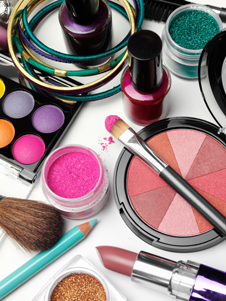3Qs: Is makeup a stepping-stone for working women?

A recent study funded by Proctor & Gamble — which sells CoverGirl and Dolce & Gabbana makeup — found that wearing makeup, up to a point, increases people’s perceptions of a woman’s likability, her competence and trustworthiness. We asked Linda Blum, associate professor of sociology and interim director of the Women’s, Gender and Sexuality Studies program at Northeastern University to assess how these findings affect women in the workplace and their professional advancement strategies. The study was conducted by Boston University and the Dana-Farber Cancer Institute.
What do these findings mean for women in the workplace? Is it a step backwards?
While the study findings do not represent an undoing of the many gains made by women, the research does have the very pernicious potential to argue that these expectations for beauty in women — which can be unattainable and repressive — are “natural” according to our evolution. It’s important that we be mindful of the solid historical and cross-cultural evidence of the variability of notions of beauty and attractiveness, as well as of competence in the workplace.
I think those flawed assumptions of beauty in women are all too convenient for cosmetic and beauty industries to push us to increase our consumption of these products.
Will women who prefer not to wear makeup feel pressured to do so in order to compete professionally?
That would be most unfortunate. This is a distraction that individualizes bigger problems. Whether or not a woman chooses to wear makeup and how much she chooses to wear is not going to override much larger social economic problems, such as the shrinking pool of good job opportunities or the persistence of great economic and racial inequality in America. We need to address these issues on the larger policy-making and economic level and not blame the individual or make her feel as though, for example, that she is unemployed because she is not attractive enough or didn’t work hard enough on a makeover.
As the presence of women in the workforce grew in the second half of the 20th century, they were able to combat the control of their bodily appearance through collective efforts. Through their unions, flight attendants, for example, successfully fought against controls imposed on their weight. Women organized and fought in courts and in unions to lift bans that claimed they couldn’t work while pregnant. In the civil rights movement of the 1960s, one of the main slogans was, “Black is Beautiful.” Many African-American women in the movement refused to straighten their hair. For these issues, the real change can come through collective efforts.
What alternate strategies, unrelated to appearance, could women employ to be successful at work?
Women can work for change on the political and national level to create more good jobs, to fund better opportunities for job training, to enlarge their ability to get a good education and get out of these WalMart jobs. Being beautiful and having your makeup “just right” at those jobs is not going to make a significant difference in a woman’s ability to provide for her family. If anything, it might hurt her to feel that she is pressured to spend a large portion of her income on cosmetic products. She would do better to work collectively with other workers to try to get better work conditions and contracts. We need to work at the grassroots and national levels to change that kind of climate against the average working families.





